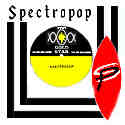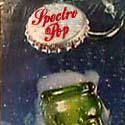THE STORY OF TINA TURNER'S
"EVERYTHING UNDER THE SUN"
Since the late 1970s, tapes have circulated among collectors of Tina Turner singing a Spectoresque version of the song "Everything Under the Sun," written by Bob Crewe and Gary Knight. After remaining in the vaults for ten years, the song had seen official release in 1976 in a Spector-produced version by The Ronettes on the Phil Spector International compilation Rare Masters Vol. 2, and had previously been issued in radically differing versions by The Walker Brothers and Jackie DeShannon.
The former, produced by Johnny
Franz and arranged by Reg Guest, was included in their 1967 album Images
as well as on two singles from the same year: as an A-side backed with
"I Wanna Know" in Japan and as the B-side of "Experience" in the
Netherlands. A live version, recorded the following year, was ultimately
issued on the 1987 Bam Caruso LP The Walker Brothers in Japan. Ms.
DeShannon"s version appears on her 1967 LP For You. (Interestingly, The
Walker Brothers covered The Ronettes" hit "Walking in the Rain" later in
1967.)
The Tina Turner version of "Everything Under the Sun" heard among that hardcore group of collectors was no doubt taken from the ARS acetate (pictured right) described by Phil Spector Appreciation Society
co-president Carole Gardiner in a 1979 newsletter as follows:
"Our good friend Malcolm Baumgart was cruisin' for wax in the Notting Hill area of this fair city when he stumbled across a market stall selling records for 50p each. Amongst these was an acetate of TINA TURNER performing "EVERYTHING UNDER THE SUN," which the stallholder claimed had once belonged to Mick Farren (NME scribe and ex-Deviant). The disc was pressed by Associated Recording Studios, 723 7th Avenue, at 48th Street (midtown Manhattan for those who have never been there). As far as we know, this is the only copy of this record in existence. It is the same song as that recorded by Phil Spector with The Ronettes, and Tina puts on her best "I'll Never Need More Than This" voice.
"It's impossible to judge from the unfinished mix if the producer is Spector or Bob Crewe, but it is WITHOUT A DOUBT AN UNISSUED PHILLES MASTER! Tina takes the song at a slower pace than the Ronettes' version and the familiar "sh-doop, sh-doop" backing vocals are absent. Her voice is double-tracked in harmony throughout parts of the song and strings and backing vocalists are featured to great effect. It starts off quietly and gradually builds to a "RIVER DEEP"-style climax, with Tina's voice joined by the brass section. The record ends with Tina repeating "I need and want you, baby" before a tremendous shriek of "BABY!" Stupendous stuff!"
As stated, the acetate that Carole described is surely the source of all those clandestinely traded tapes from the "70s on, but there is at least one other acetate of Tina"s version. While it, like "River Deep..." and the other Spector sessions, is credited on the label to Ike and Tina Turner, it is known that Ike was not actually present when those recordings were made, and it seems just as unlikely that he was there for "Everything Under the Sun." The two-sided 7" acetate, dated September 19, 1966, is backed with the same version of "Two to Tango" that was the B-side of "A Man Is a Man" on Philles 134 (another extremely rare Philles recording). As you can see from the photo of the Bell acetate, someone has crossed out the 4:00 time originally listed and written "3:56" instead. Since The Ronettes didn"t cut it until October 1966, it would also appear that Tina had the original outing with this great tune.
It is extremely uncommon for two acetates to be pressed with identical takes, mixes, and mastering, and we have no exception here. While they are certainly similar, subtle differences exist between the two that suggest that the Bell acetate is, if not the finished product, at least closer to it than the ARS acetate. The mix on the Bell acetate appears to be different from that on the ARS acetate. In particular, the swirling string line is very present on the fade on this disc but just barely on the ARS disc. The subtler placing of the bass line on the Bell disc further indicates that this is the more polished version. More significantly, the Bell disc is a glorious seven seconds longer on the fade, giving us just that much longer to hear Tina's ad libs as the record ends.
Because of the pairing of "Everything..." with "Two to Tango" on this disc, and given the former"s profound stylistic similarity to the version of the song released by The Walker Brothers, which Bob Crewe produced, it seems logical to conclude that, Spector influence notwithstanding, this is indeed a Crewe production. The fact that it was recorded in New York rather than Los Angeles furthers this theory. Recently Don Charles noted on the Spectropop Discussion Forum, "I remember Bob Crewe telling me that he produced that track with Tina Turner when I interviewed him several years ago. He was quite proud of it (deservedly so), and he regretted that it has never gained wide release."

David Young for the Spectropop Group



![]()